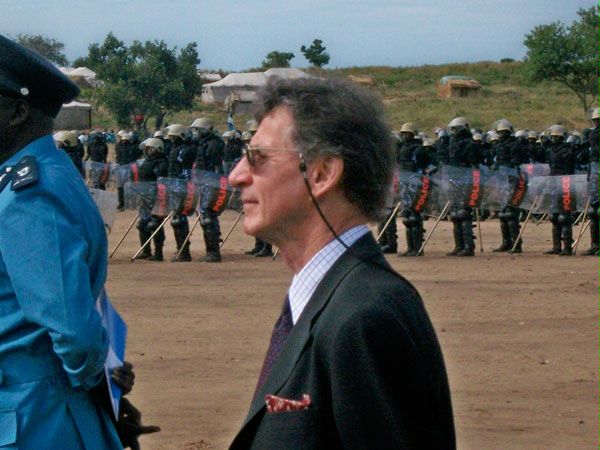
GOMA, Democratic Republic of Congo — Amid new evidence of Rwandan support for the rebellion across the border in the eastern Democratic Republic of Congo’s Rutshuru territory, revealed by the United Nations Group of Experts, U.S. Special Advisor to the Great Lakes Barrie Walkley visited the region. He met first with Rwandan authorities in Kigali last week, where he conveyed the message that “external support to the M23 group must stop,” as he told local media in Goma shortly after crossing the border into Congo. He referenced the press release by the U.S. government asking Rwanda to stop any and all of their assistance to the M23 rebel group, which was published shortly after the release of the U.N. group’s report. Ambassador Walkley also held a closed-door, hour-long meeting with North Kivu’s governor Julien Paluku Kahongya, during which they reportedly also discussed the current security issues with regards to armed groups, including the M23. Walkley then traveled to Kinshasa and met with Congolese President Joseph Kabila.
Shortly before Walkley’s visit to Goma, Rwanda’s presidency vehemently rejected any evidence of its support for the M23 and accused Paluku of linking up the Congolese government with the Hutu militia, the FDLR, to attack Rwanda. The allegation was grounded on a letter written by the governor on June 19 to MONUSCO requesting a U.N. flight for eight individuals, including two Belgians of Rwandan origin, working for a “peace and reconciliation program” run by the Church of Christ in Congo in partnership with Norway. The letter stated that the delegation was to go to Mutongo in Walikale territory to encourage FDLR combatants to voluntary return to Rwanda. Rwanda-Congo agreements clearly stipulate that sensitization of the FDLR to return falls under to Congolese government.
Trying to fend off the accusation and make clear that his government was, on the contrary, working to eliminate the threat of the FDLR, Governor Paluku proclaimed, “No sensible person would ally with genocide crimes-tainted individuals to plan attacks against Rwanda.” Addressing the media, the governor warned of the danger the FDLR represents. “If we’re not aware of that, our neighboring friends, the Rwandans, will keep having rights over us, believing that we’re supporting the FDLR,” Paluku said, adding that he doesn’t see any other lasting solution except to target the group militarily.
“Since I took the province’s governorship in 2007, 28,605 Rwandan refugees have so far been returned to their country, and a total of over 107,800 refugees have been repatriated to Rwanda since 1999, as a result of provincial efforts,” the governor said. While such statistics sound derisory compared to the 2 million Rwandan refugees who came to eastern Congo in 1994, the Congolese military was making some significant advances against the FDLR until the army mutiny of the M23 broke out.
In the meantime, the M23 has kicked out the Congolese army from several strategically important locations in Rutshuru, including the border town Bunagana, Jomba, Rutshuru town, Ntamugenga, and Rubare—in several instances without much resistance. While the M23 fighters have in some cases retreated, allegedly to give way to the national police and MONUSCO to avoid any more civilian casualties, they still control the sites through their allied police officers and are on stand-by if government forces should make any attempts to retake lost territory. In a press briefing in Washington on Tuesday, the U.S. State Department spokesman, Patrick Ventrell, reiterated the sentiment of the press release and Walkley’s statements, saying the U.S. is “deeply concerned” by the findings of recent investigations that indicate Rwanda’s hand in the mutiny. While he didn’t provide details, Ventrell said, “we’re clearly engaged with the Rwandan government" over the allegations.
Reflecting on the U.S. statements, Sasha Lezhnev, Senior Policy Analyst at the Enough Project, said:
The U.S. statements on Rwandan support are important steps in the right direction, but soft diplomacy has not had an effect thus far. M23 is overwhelming Congo's strongest forces because of continued support by Rwanda and is even more determined in its agenda to retake control of the lucrative conflict minerals trade and economic positions. It is time for the Obama administration and the U.N. to ratchet up pressure and place targeted sanctions on officials who are aiding the rebels, as they have violated an international arms embargo in seven different ways, according to the U.N. Group of Experts. Only real consequences for reckless behavior will have an effect on mitigating this crisis.
Photo: Ambassador Barrie Walkley during his previous post in South Sudan (State Department)

